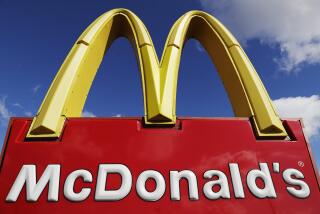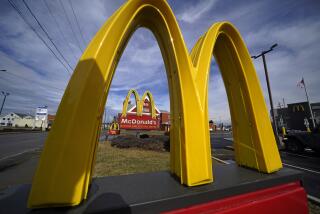Bouncing Back : Jack in the Box Burger Chain Sees Sales Start to Recover
Heavy discounting and renewed advertising have helped sales start to rebound for Jack in the Box, which in mid-January sold undercooked, tainted hamburgers that sparked a food-poisoning epidemic.
And while there is evidence that the food-poisoning scare affected some other fast-food operations, they too report that business is returning to normal.
Still, indications are that concern about meat safety is becoming something of a popular preoccupation:
* “Our Beef Is USDA Inspected and Charbroiled for Your Safety,” reads a movie marquee-style sign at a Burger King in West Los Angeles.
* Rare hamburgers are a thing of the past at the Tapestry restaurant, a hot spot among the skiing crowd in Park City, Utah. To comply with a new county ordinance, the restaurant has adopted a policy that all burgers must be cooked thoroughly, even if a customer requests otherwise.
* Alpha Beta supermarkets recently advertised that its butchers “take the time to sterilize our meat department every day.”
Two children remain hospitalized in Seattle with the same type of E. coli bacterial infections that killed three children and sickened at least 500 other people since mid-January in a disease outbreak that was linked in large part to hamburgers sold by Jack in the Box in Washington and three other states.
Federal investigators have said that thorough cooking of the meat, which probably was contaminated by animal feces at the slaughterhouse, would have killed the bacteria.
Sales at Jack in the Box restaurants plummeted as news of the poisonings spread. But now, sales are inching back up with the help of the promotion program that resumed about three weeks ago, said Sheree Zizzi, spokeswoman for San Diego-based Foodmaker, the chain’s parent company. The company still is not advertising in Washington, she said.
“We’ve seen some improvement from the 30% to 35% declines we were experiencing right after the outbreak,” she said. Zizzi could not provide sales totals, but she noted that it would take “several months” to return to levels recorded before the incident.
Jack in the Box is still feeling the pinch. Foodmaker last week laid off 27 employees who plan and build new outlets as a result of its suspension of all expansion plans. In addition, the company sent a letter to about 400 landlords asking for a 25% break in rent rates for one year.
Woodland Hills-based Herrick/Socios Cos., which owns 52 Jack in the Box franchises, had laid off 200 employees in the Los Angeles area after sales dropped off. But business has improved, and the company has begun to rehire some of the employees, said Terry Herrick, a partner in the company.
“It looks like we’ve hit bottom and we’re turning around, almost on a daily basis,” he said.
Herrick said the chain is promoting its new, stricter quality control measures through displays near the cash registers. “It helps to get the message out.”
The Jack in the Box episode appears to have created some fallout for others in the restaurant industry.
Officials of the Wendy’s and Carl’s Jr. restaurant chains declined to provide sales figures, but they said customers seemed to shift temporarily from burgers to other products. But product shifting was also because of the chains’ heavy promotion of chicken products, which had been planned before the food-poisoning episode, officials from the two operations said.
“Sales were affected in Seattle, as I think every restaurant chain was affected in Seattle,” said Denny Lynch, spokesman for Wendy’s International. “The farther you moved away from there, the less the effect.”
At McDonald’s, the incident “has had absolutely no effect on business whatsoever,” said spokeswoman Terri Capatosto.
But food safety is definitely on the minds of potential fast-food customers.
Westside resident Bonnie Steves found herself in fast-food restaurants during a recent weekend getaway and she said she was more concerned than usual about the food.
“I’m not a fast-food person per se,” Steves said, adding that she ordered a chicken sandwich at one restaurant and a breakfast muffin with egg at another. “The last thing I was going to order was meat,” she said.
The West Los Angeles Burger King put up the sign touting the safety of its beef to reassure customers immediately after the food-poisoning outbreak, said manager Elizabeth Taay.
“We put the sign up so people would not be scared about coming in,” Taay said. “People were happy to see it and we maintained the same business and had even more.”
Foodmaker Slips
Foodmaker, parent of Jack in the Box, saw its stock price plunge after the San Diego-based fast-food chain was linked to an outbreak of food poisoning primarily in the Pacific Northwest.
January 18, 1993--Washington state health authorities tied the food poisonings to hamburgers served at Jack in the Box restaurants. Jack in the Box recalled suspect beef patties.
January 22, 1993--A 2-year-old Tacoma, Wash., boy died less than two weeks after eating a contaminated Jack in the Box hamburger.
Wednesday March 10, 1993--$8.75 (+37.5 cents)
More to Read
Eat your way across L.A.
Get our weekly Tasting Notes newsletter for reviews, news and more.
You may occasionally receive promotional content from the Los Angeles Times.










